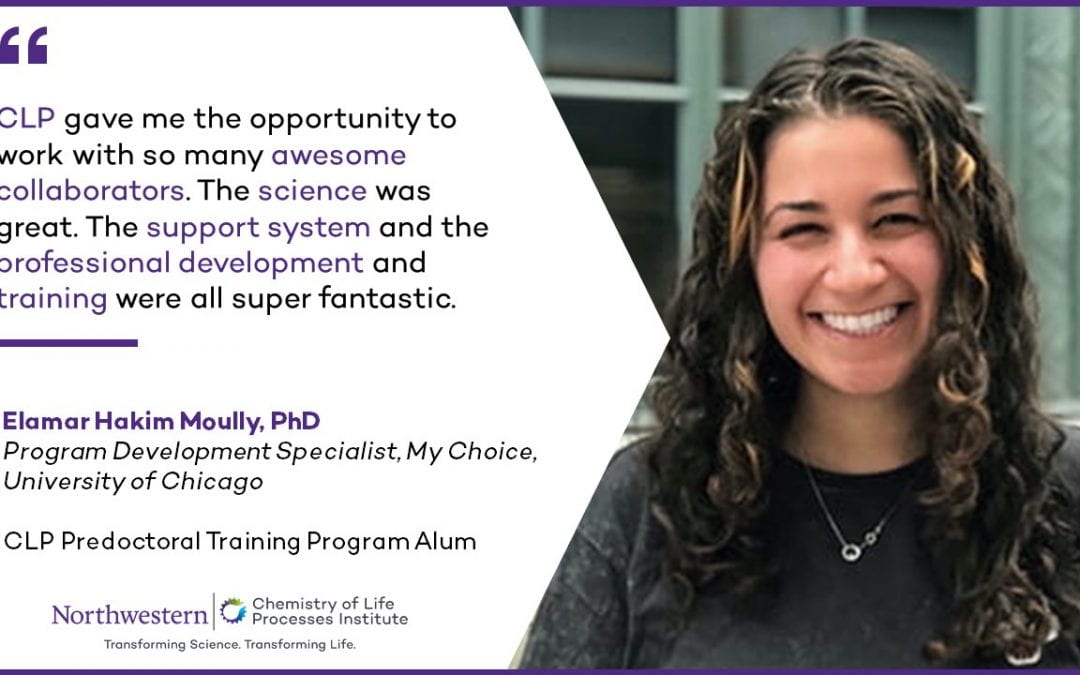Meet Elamar Hakim Moully, PhD, program development specialist of myCHOICE at the University of Chicago. Elamar is a CLP Predoctoral Training Program alum, and graduate of Northwestern’s Chemistry Program. Her CLP Training Program Preceptors were Milan Mrksich and Chad Mirkin.
What was the focus of your pre-doctoral research?
I joined the SAMDI team in the Mrksich lab, which is very interdisciplinary and does a lot of biology, chemistry, and engineering. SAMDI is a mass spectrometry-based technique that you can use to look at enzyme activity in a variety of applications. There’s a lot of interest now in looking at enzyme activity in the single cell level because we know that, especially with cancer, even if we think of cells as genetically identical, they are going to have a lot of differences, given nature and biology. My task was to get it to the single cell level using SAMDI which hadn’t been done yet in the lab. We collaborated with the Mirkin lab to see what spherical nucleic acids (SNAs), used as preclinical treatment against certain types of cancer, could do at the single cell level as well. I got to work with Gokay Yamankurt, another [former] CLP trainee, who was a fantastic overall mentor. I spent a lot of time trying to increase sensitivity in the assays to get to the single cell level which we eventually achieved. I also learned how to make SNAs. We were going on to more interesting targets the Mirkin group was working on, but we realized that that was a much bigger undertaking. Even without SNAs, we learned a lot about how to formulate it along the way and how to make it more appropriate for more of the biology and what we ultimately hope to do.
What drew you to your first job out of graduate school and what are you doing now?
I loved doing the science, but realized I’m much more of a people person. What excites me most is talking to people about their science and helping them figure out what to do with it. My position at the University of Chicago is just that—it’s for a program called myCHOICE which essentially is professional development and career exploration for graduate students and post docs in the sciences. It’s seminars, internships, workshops, and everything about helping students. The idea is both to explore career options and then learn more about it. The program has three tiers: explore, educate, and experience that help all trainees—from trying to figure out what they want to do, to helping them get internships and job search later on. A big part of it is networking, which is a very important part of graduate school. I think a lot of grad students, myself included, are very intimidated by the idea of networking.
How did CLP support your journey?
What I really appreciated about CLP was that I had access to so many different events to learn about different careers. I remember, specifically, a science communication workshop with [Second City improvisation instructor and science communications consultant] Heather Barnes. I remember talking to her afterwards and asking, “how did you get that role, because that sounds great!” She said that she realized that she was so much more excited talking to the students and adults that were coming to see the exhibits at the Planetarium where she worked, than learning about the science itself. And I felt, that’s so true!
In my second year, I also helped with a biomedical career forum offered by CLP. The training program helped me realize there’s so much we can do with our PhD than I initially thought. Through that, I knew I wanted to do more of the program development and outreach-type of work related to science and started looking at those types of roles. If it wasn’t for CLP, and really talking to a lot of people, I don’t think that I would have known how many options there were. I was very lucky to have had all of this exposure and experiences, that a lot of my peers didn’t who weren’t in CLP.
What was a highlight of your time at Northwestern?
I loved being a CLP trainee. For me, it was the people. Everyone I met, both the other students that I got to know super well and the administrators, were fantastic. The community was great—people like [program administrator] Penelope Johnson, who you knew were always on your side. I always felt comfortable coming to them and chatting about everything from science to careers to ‘Dancing with the Stars’. I knew that they were there to help me and support me. Everything that they did was for us, all the events they organized, all the food, all the swag was for us. And I really appreciated that. I also liked that CLP gave me the opportunity to present my research twice which was great practice. A lot of people, myself included, used it as an opportunity to practice before our qualifying exams in sort of a low-stakes environment.
CLP gave me the opportunity to work with so many awesome collaborators. The science was great, the support system, the community, and the professional development and training, were all super fantastic.
by Lisa La Vallee

